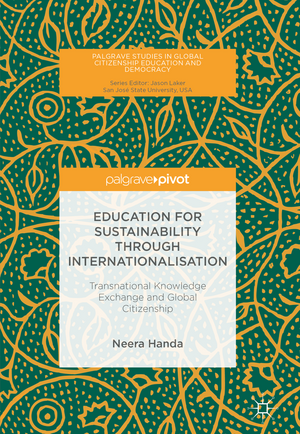Education for Sustainability through Internationalisation: Transnational Knowledge Exchange and Global Citizenship: Palgrave Studies in Global Citizenship Education and Democracy
Autor Neera Handaen Limba Engleză Hardback – 29 aug 2018
Din seria Palgrave Studies in Global Citizenship Education and Democracy
- 20%
 Preț: 567.59 lei
Preț: 567.59 lei -
 Preț: 399.29 lei
Preț: 399.29 lei - 18%
 Preț: 727.00 lei
Preț: 727.00 lei - 18%
 Preț: 894.03 lei
Preț: 894.03 lei -
 Preț: 382.57 lei
Preț: 382.57 lei -
 Preț: 383.12 lei
Preț: 383.12 lei -
 Preț: 392.60 lei
Preț: 392.60 lei - 18%
 Preț: 890.54 lei
Preț: 890.54 lei - 18%
 Preț: 725.75 lei
Preț: 725.75 lei - 15%
 Preț: 698.15 lei
Preț: 698.15 lei - 15%
 Preț: 585.26 lei
Preț: 585.26 lei - 18%
 Preț: 783.81 lei
Preț: 783.81 lei -
 Preț: 451.87 lei
Preț: 451.87 lei - 18%
 Preț: 891.80 lei
Preț: 891.80 lei -
 Preț: 386.22 lei
Preț: 386.22 lei -
 Preț: 457.80 lei
Preț: 457.80 lei - 18%
 Preț: 723.38 lei
Preț: 723.38 lei - 15%
 Preț: 637.78 lei
Preț: 637.78 lei -
 Preț: 485.46 lei
Preț: 485.46 lei - 15%
 Preț: 693.39 lei
Preț: 693.39 lei -
 Preț: 387.75 lei
Preț: 387.75 lei - 15%
 Preț: 698.94 lei
Preț: 698.94 lei -
 Preț: 395.47 lei
Preț: 395.47 lei
Preț: 416.54 lei
Preț vechi: 473.33 lei
-12% Nou
79.70€ • 83.44$ • 65.95£
Carte tipărită la comandă
Livrare economică 05-19 aprilie
Specificații
ISBN-10: 1137502967
Pagini: 160
Ilustrații: XV, 245 p.
Dimensiuni: 148 x 210 x 17 mm
Greutate: 0.47 kg
Ediția:1st ed. 2018
Editura: Palgrave Macmillan UK
Colecția Palgrave Pivot
Seria Palgrave Studies in Global Citizenship Education and Democracy
Locul publicării:London, United Kingdom
Cuprins
Chapter 1. One dark night of the full moon.- Chapter 2. OM.- Chapter 3. Truth is one.- Chapter 4. Da Da Da. Chapter 5. Sangam.- Chapter 6. Karam YoGi.- Chapter 7. Sarvodaya in internationalised education for sustainability.- Chapter 8. Punaarambh and the new global citizen
Notă biografică
Neera Handa is an Adjunct Fellow for Learning Transformations at Western Sydney University, Australia.
Textul de pe ultima copertă
This book suggests how the internationalisation of teaching and learning for sustainability can be a vehicle for a two-way flow of knowledge across national, cultural and theoretical boundaries. Establishing links between the internationalisation of education and the ideal of global sustainability, the author presents innovative alternative solutions to address the pressing social, environmental and ethical problems of our age, a global priority demanding an educational response. By engaging with the Hindi concept of tri-vid, the three-in-one unification of knowledge, the author reassesses the very nature of knowledge through the intellectual agency of both students and educators. Once opportunities for alternatives not available in dominant Western knowledge traditions are recognised, the development of an innovative alternative perspective becomes possible. This pioneering book will be of interest to students and scholars of international education, sustainability education and globalisation.
Descriere
This book suggests how the internationalisation of teaching and learning for sustainability can be a vehicle for a two-way flow of knowledge across national, cultural and theoretical boundaries. Establishing links between the internationalisation of education and the ideal of global sustainability, the author presents innovative alternative solutions to address the pressing social, environmental and ethical problems of our age, a global priority demanding an educational response. By engaging with the Hindi concept of tri-vid, the three-in-one unification of knowledge, the author reassesses the very nature of knowledge through the intellectual agency of both students and educators. Once opportunities for alternatives not available in dominant Western knowledge traditions are recognised, the development of an innovative alternative perspective becomes possible. This pioneering book will be of interest to students and scholars of international education, sustainability education and globalisation.
